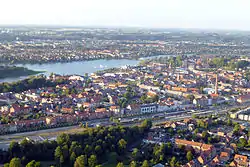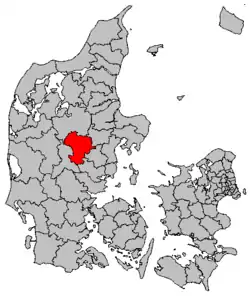Silkeborg Municipality
Silkeborg Municipality (Danish: Silkeborg Kommune) is a municipality (Danish, kommune) in Region Midtjylland on the Jutland peninsula in central Denmark. The municipality covers an area of 857.16 km2, and has a population of 99,400 (1. January 2023). Its mayor is Steen Vindum, of the party Venstre. The main town and the site of its municipal council is the town of Silkeborg.
Silkeborg Municipality
| |
|---|---|
 | |
 Coat of arms | |
 Location in Denmark | |
| Coordinates: 56°10′42″N 9°33′05″E | |
| Country | Denmark |
| Region | Central Denmark |
| Established | 1 January 2007 |
| Government | |
| • Mayor | Helle Gade |
| Area | |
| • Total | 857 km2 (331 sq mi) |
| Population (1. January 2023)[1] | |
| • Total | 99,400 |
| • Density | 120/km2 (300/sq mi) |
| Time zone | UTC+1 (CET) |
| • Summer (DST) | UTC+2 (CEST) |
| Website | www |
On 1 January 2007 Silkeborg municipality was, as the result of Kommunalreformen ("The Municipal Reform" of 2007), merged with Gjern, Kjellerup, and Them municipalities to form the new Silkeborg municipality.
The municipality is part of Business Region Aarhus and of the East Jutland metropolitan area, which had a total population of 1.378 million in 2016.[2][3]
Locations
| Silkeborg | 47,000 |
| Kjellerup | 5,100 |
| Sejs-Svejbæk | 4,300 |
| Virklund | 3,507 |
| Them | 2,300 |
| Ans | 1,900 |
| Voel | 1,600 |
| Bryrup | 1,500 |
| Gjern | 1,500 |
| Fårvang | 1,400 |
The town of Silkeborg

The town is of Silkeborg is divided north and south by the lake, Silkeborg Langsø, which at the eastern side of the town, resolves into the Guden River (Gudenaa). Silkeborg was the home town of COBRA painter Asger Jorn, and has several interesting art museums and exhibitions, including Museum Jorn, Silkeborg with its large Asger Jorn collection.
Politics
Municipal council
Silkeborg's municipal council consists of 31 members, elected every four years.
Below are the municipal councils elected since the Municipal Reform of 2007.
| Election | Party | Total seats |
Turnout | Elected mayor | |||||||||
|---|---|---|---|---|---|---|---|---|---|---|---|---|---|
| A | B | C | F | I | K | O | V | Ø | Å | ||||
| 2005 | 11 | 1 | 2 | 3 | 1 | 1 | 12 | 31 | 71.8% | Jens Erik Jørgensen (C) | |||
| 2009 | 10 | 3 | 6 | 2 | 10 | 68.6% | Hanne Bæk Olsen (A) | ||||||
| 2013 | 9 | 1 | 2 | 2 | 1 | 3 | 11 | 2 | 76.3% | Steen Vindum (V) | |||
| 2017 | 10 | 1 | 1 | 2 | 1 | 2 | 11 | 2 | 1 | 74.7% | |||
| Data from Kmdvalg.dk 2005, 2009, 2013 and 2017 | |||||||||||||
References
- BY2: Population 1. January by municipalities The Mobile Statbank from Statistics Denmark
- "What is Business Region Aarhus". businessregionaarhus.dk. Retrieved 15 January 2019.
- "Tal og statistik" [Figures and Statistics] (in Danish). Byregion Østjylland. Retrieved 25 April 2016.
Sources
External links
- "Bs - Kommunefakta - Kommunale nøgletal for de danske kommuner". August 12, 2007. Archived from the original on August 12, 2007.
- "Danmarkskort". October 11, 2007. Archived from the original on October 11, 2007.
- "Danmark". kort.krak.dk.

